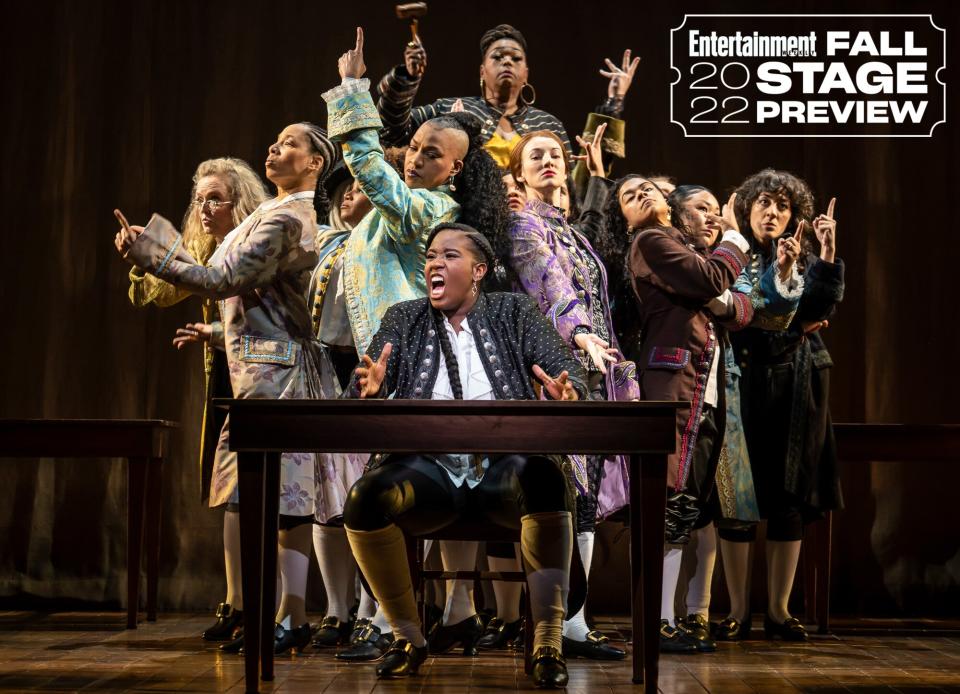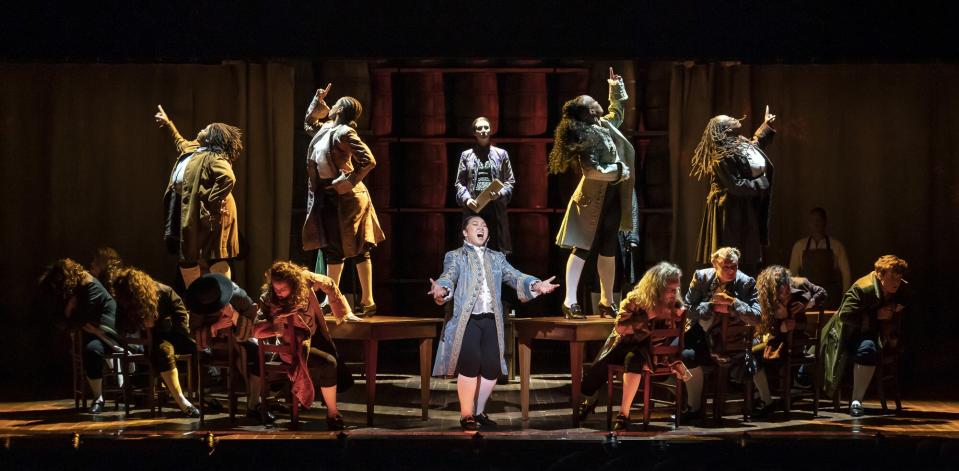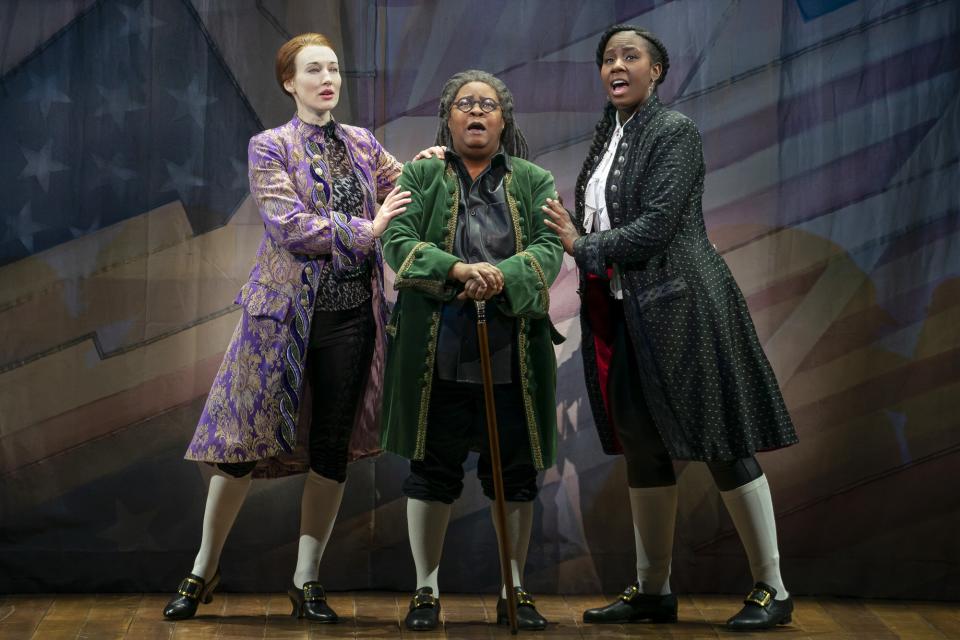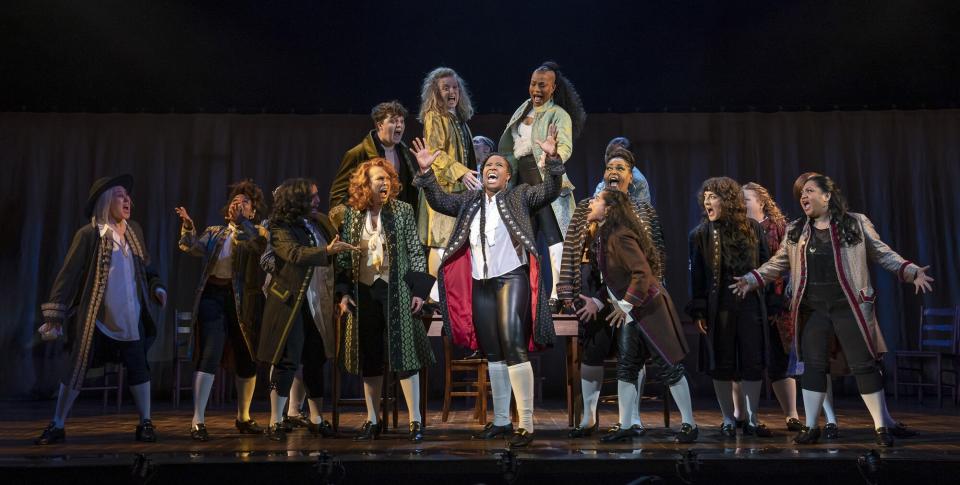How a non-traditional revival of 1776 seeks to view American history as a reckoning
- Oops!Something went wrong.Please try again later.
- Oops!Something went wrong.Please try again later.
Sit down, John... because it's someone else's turn to speak.
That's the core notion at the heart of a new revival of 1776, coming to Broadway this fall courtesy of the Roundabout Theatre Company and A.R.T. The 1969 musical from Peter Stone and Sherman Edwards gets turned on its head in a re-imagining that casts a range of ethnicities, races, and genders in the buckled shoes of the founding fathers.
"It's giving new life to words that we would otherwise allow to go over our heads," says co-director and choreographer Jeffrey Page of the show's approach. "To hear women and gender non-conforming folks speak these words, it lifts them up in a very different way. It almost transports the words into a place of poetry. How can these words be something new? The casting has really opened up and expanded the meaning of what this show actually is, and the poetry that's so deeply ingrained inside of it."

Joan Marcus
This particular production was supposed to premiere back in 2020, with a reading occurring in early March just before lockdown. Diane Paulus, who is know for her inventive, Tony-winning revivals such as The Gershwin's Porgy and Bess, Hair, and Pippin, was set to direct, with Page as choreographer.
Paulus, who now co-directs with Page, was approached by the estate about the possibility of a non-traditional revival. Previously, she'd only known it as what she imagined was a stodgier, more traditional musical that beat out the more radical Hair for Best Musical in 1969. But after diving into the book, she was struck by the freshness of the text and the possibilities of re-imagining it with a cast that looked nothing like the actual founding fathers, including people of color, trans, and non-binary actors.
"Every single person on the stage would not have been allowed into Independence Hall," Paulus tells EW. "There is a reclaiming of American history that bridges the historical moment of 1776 and the realities of where we are in America today. We are great believers that the audience can hold these two realities at the same time. You can listen to these historical figures and this historical aspirational text that includes statements like, 'All men are created equal' — and witness and experience a cast with this kind of representation in it. It complicates and deepens and layers our understanding of not only America's history, but the moment we're living in today."
Those that have seen any of Paulus' previous work will recognize that she's not interested in a revival that simply remounts a beloved show through the rose-colored glasses of nostalgia. Instead, she prefers to interrogate a work and give it new life. When she first read 1776, she was shocked at the potential within its dramatic scenes to do just that.
"I read them," she recounts, "and I thought, this is speaking exactly to the moment we're in — this crisis in the country of 'Are we together? Have we ever been a United States of America? How are we understanding what is our common ground in this country?'"
That allowed her to feel like the Peter Stone book offered something to fulfill her own personal remit as a director. "How do you create the world on stage as the director that will allow the work itself to vibrate with the most potent meaning for the moment we're living in?" she posits. "Because the theater is about the present moment and the theater is about what we experience now. What keeps me up at night is — how do you make something that will feel like it's crackling on the page? It's not just a nice theater show. It's got to feel necessary. It's got to feel vital. It's got to feel that you have to see it right now."

Joan Marcus
That vitality and sense of urgency was unexpectedly magnified by an unplanned two-year delay in bringing this version of 1776 to Broadway. The events of 2020 and 2021 — from the civil unrest and activism sparked by the George Floyd, Breonna Taylor, and Ahmaud Arbery murders to the events of January 6th — helped challenge Paulus, sending her and Page into an extensive research process that led them to tear up what they had started with and begin again from scratch (and upgrade Page to co-director).
"When everything started to take shape in society with respect to the civil unrest — George Floyd, Breonna Taylor, Ahmaud Arbery — we were in dialogue for all of those moments," explains Page. "I remember us coming together and really asking, 'What are we attempting to do? Are we attempting to replicate and rebuild some memory that's deep in our head? Or are we actually attempting to thrust forward something new and powerful that could potentially shift the minds of people?"
From that emerged the concept of a framing device, showing the cast taking on the personas of the founding fathers for the purpose of complicating their re-telling of the signing of the Declaration of Independence.
"We see this phenomenally diverse representation of humans on the stage literally step into the shoes of the founding fathers," details Paulus. "You are beholding every actor on that stage and their identity that would've been blocked and barred. You are holding it at the same time that you're holding this historical text."
As part of that approach, Page, who runs a nonprofit focused on the ethnology and documentation of dance of the African diaspora, wanted to implement the concept of masquerade in the staging and choreography. Referencing cultural celebrations like Carnival and Mardi Gras, he points to masquerade's role in giving a medium for the oppressed to speak truth to power through satire.
"What are the shoes and the coats [of the founding fathers]?" he asks. "In my mind, the shoes and the coats are a masquerade, an enactment. I'm bringing everything that I am with respect to African dance structure, African-American folklore to the table. It's important for people to transport themselves into another kind of body so that they can start to tell stories that they are not always given the power to tell. Putting on that mask allows them the power to tell the story in a different and more efficient way."

Joan Marcus
Of course, inevitably, any production that seeks to re-cast the founding fathers in a non-traditional way is going to earn comparisons to Hamilton — particularly because Lin-Manuel Miranda has repeatedly pointed to 1776 as an inspiration point. But Page and Paulus are quick to stress the differences in approach.
"Hamilton's about Alexander Hamilton and 1776 is about the Declaration of Independence and this democratic process of writing America into existence," says Paulus. "It also deals with the major compromise of pushing the institution of slavery under the rug at the aspirational moment of creating a vision for America based on freedom and equality."
"We were all fans of Hamilton, but Hamilton is a different kind of celebration of American history and representation with its casting," she continues. "We have representation in our casting, but in our production we are ripping open the wound and the original sin of this country in one of the founding moments, this cultural myth of 1776."
A large part of that rested in not only staging, but also casting. Page and Paulus say they went through an exhaustive casting process with a unique approach — instead of having actors read pages from the script, they asked them to come in prepared to read sections of the Declaration of Indepedence itself.
"We must have heard it over 500 times," says Paulus. "But it was profound and it was deep because people would come in and start crying. They would throw things; they would get so upset. I think a lot of people don't read the Declaration of Independence, but to really encounter it and to see how people were personally connecting with those words was so illuminating."
Page says a large part of their casting and staging was done with the intent of disrupting binaries — class, race, gender, etc. He hopes that this will both complicate systems built atop such binaries, while also reminding audiences of the precarious and precious state of democracy and the American experiment.
"The things that we love so much are often the things that are the most fragile," he muses. "Thinking about these founding fathers and upholding democracy, the slightest thing could have gone awry. Our cast is now complicating our ideas of the binary that has held this particular society together. We have to be ever present and ever attentive because we understand how quickly that these things can fall apart."

Joan Marcus
For both Page and Paulus, revivals aren't about recreating what was put on stage in its original form, but rather in recreating the feelings it might have evoked. "I always am interested in the impact a show had in its original creation and rather than doing a museum replica of that, I want to create the same impact now," explains Paulus. "I always want to speak to the moment we're living in while respecting the original impact of the show. I love working on revivals because you're carrying both the cultural memory of its production history and the need to make it feel as vital now."
Adds Page: "There's the feelings of the original audiences — and how do you get that same feeling in the now? That feeling is a spirit that shifts. It is a spirit that is transformative and goes from form to form."
That vitality comes in pushing audiences to think about who was included and excluded in the founding of this country. This production of 1776 wants you to not only absorb history, but to interrogate it — to hold it up to the light and be willing to question it.
"How can we look at American history not as an affirming myth, but as a reckoning?" asks Paulus. "How does looking backwards at our history, boldly and honestly, allow us to find a path forward together? Nobody owns American history. It's this idea of what is American history? for our modern audience in all its 2022 diversity and how can that world connect through our production?"
1776 opens at the American Airlines Theatre Oct. 6 and runs, in a limited engagement, through Jan. 8.
Related content:

